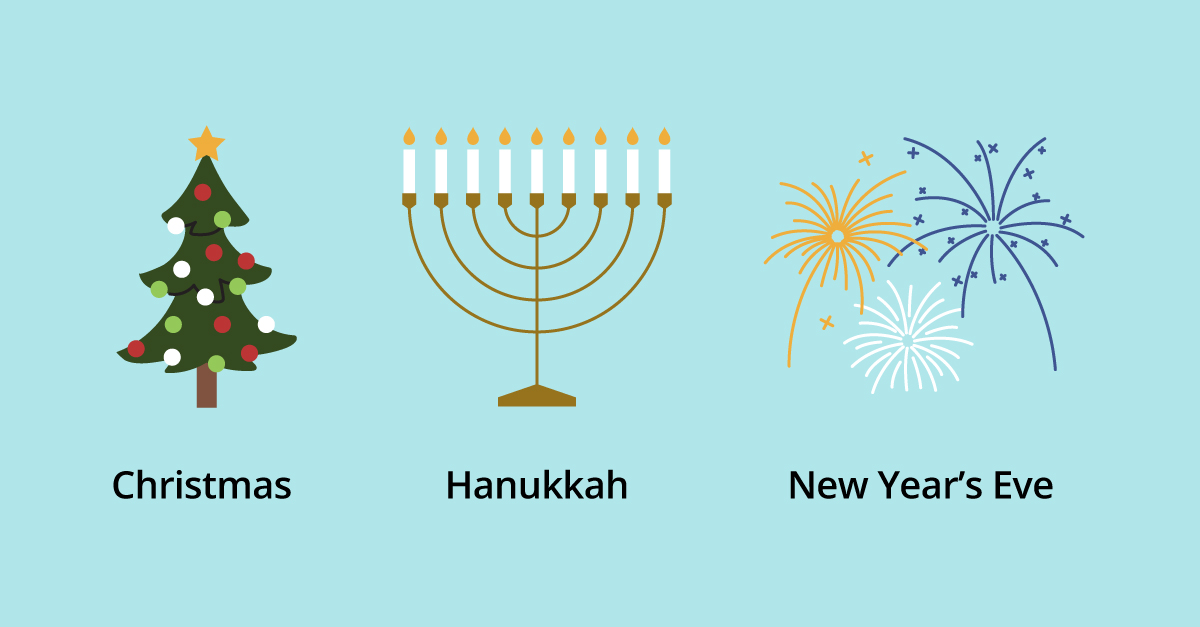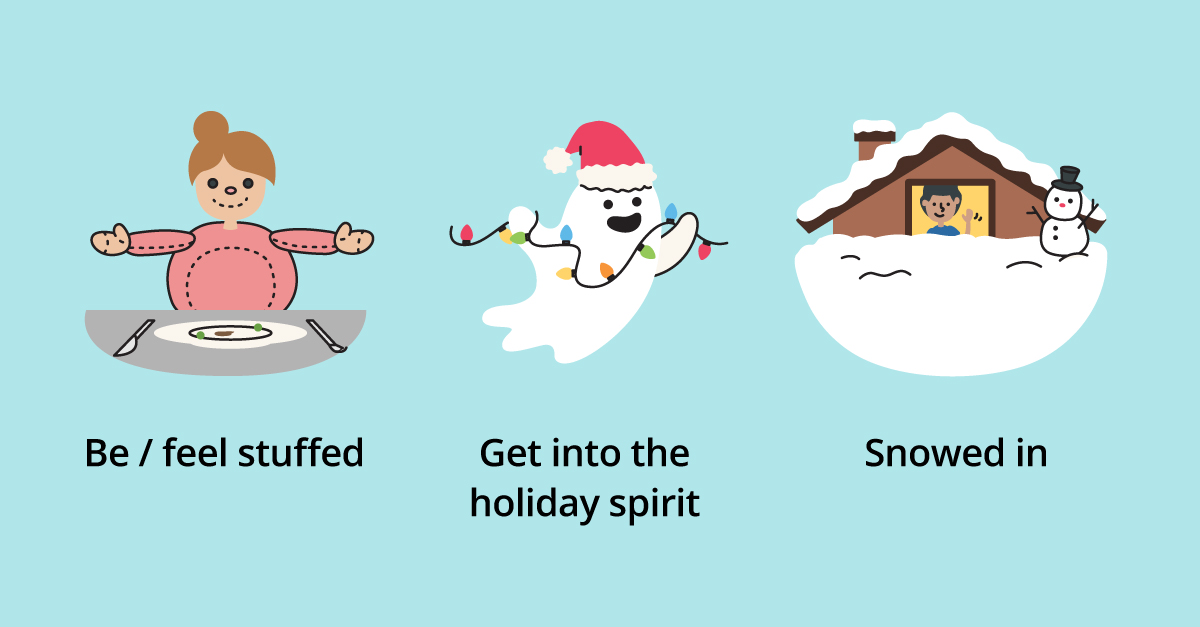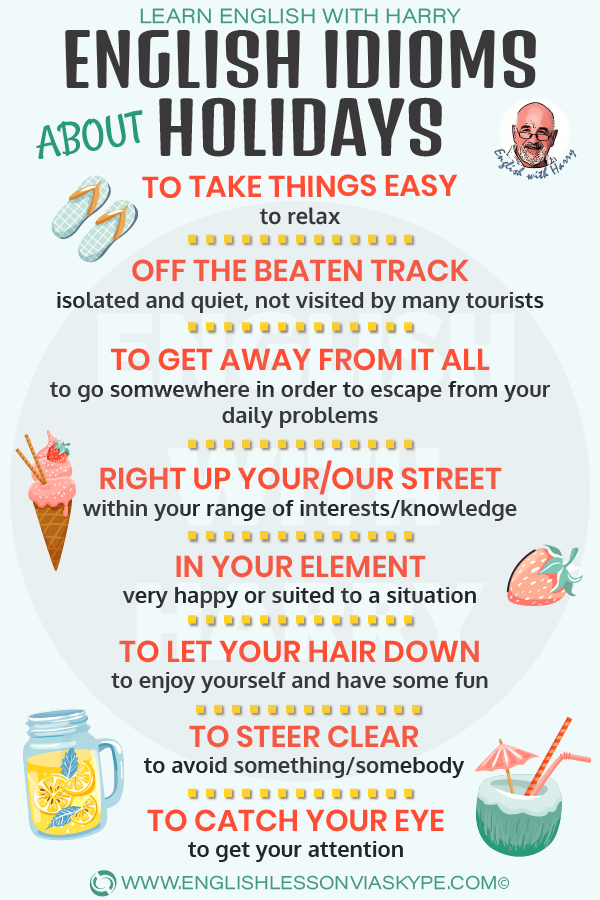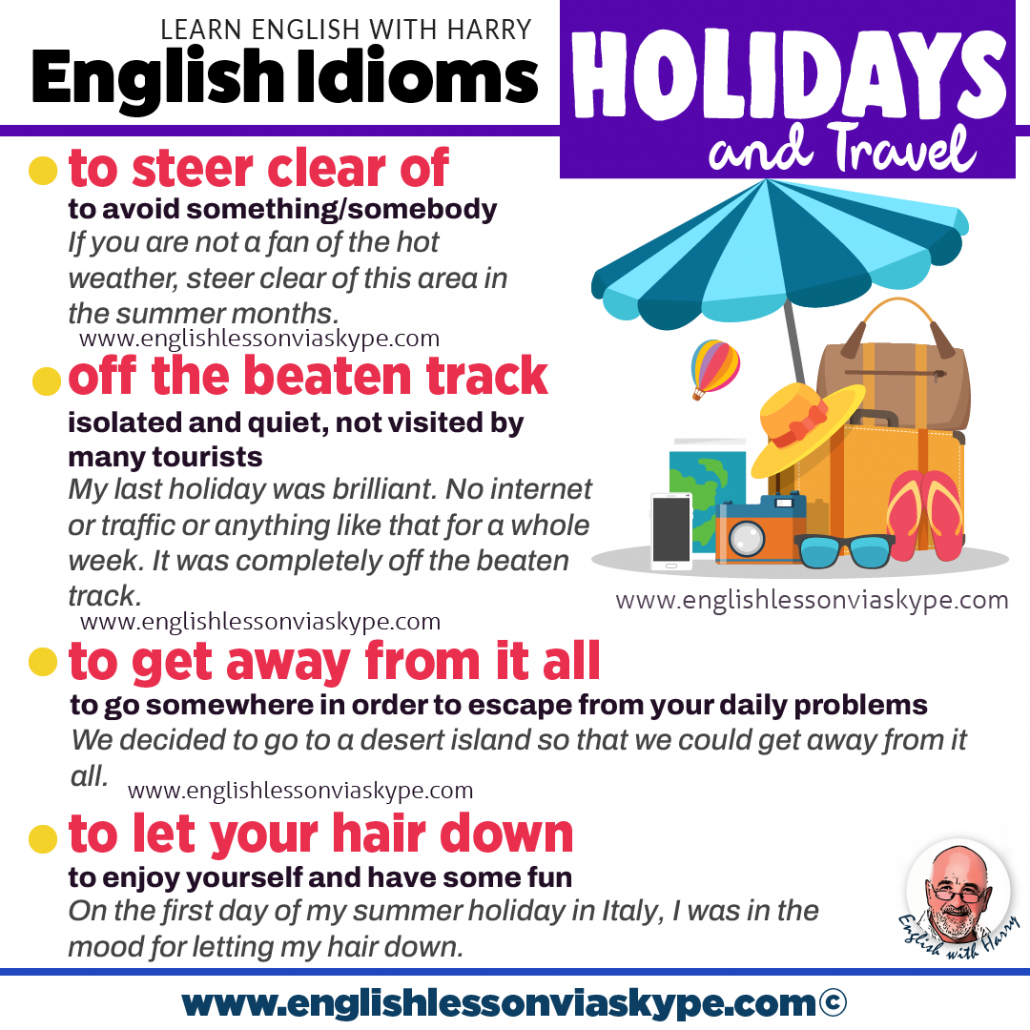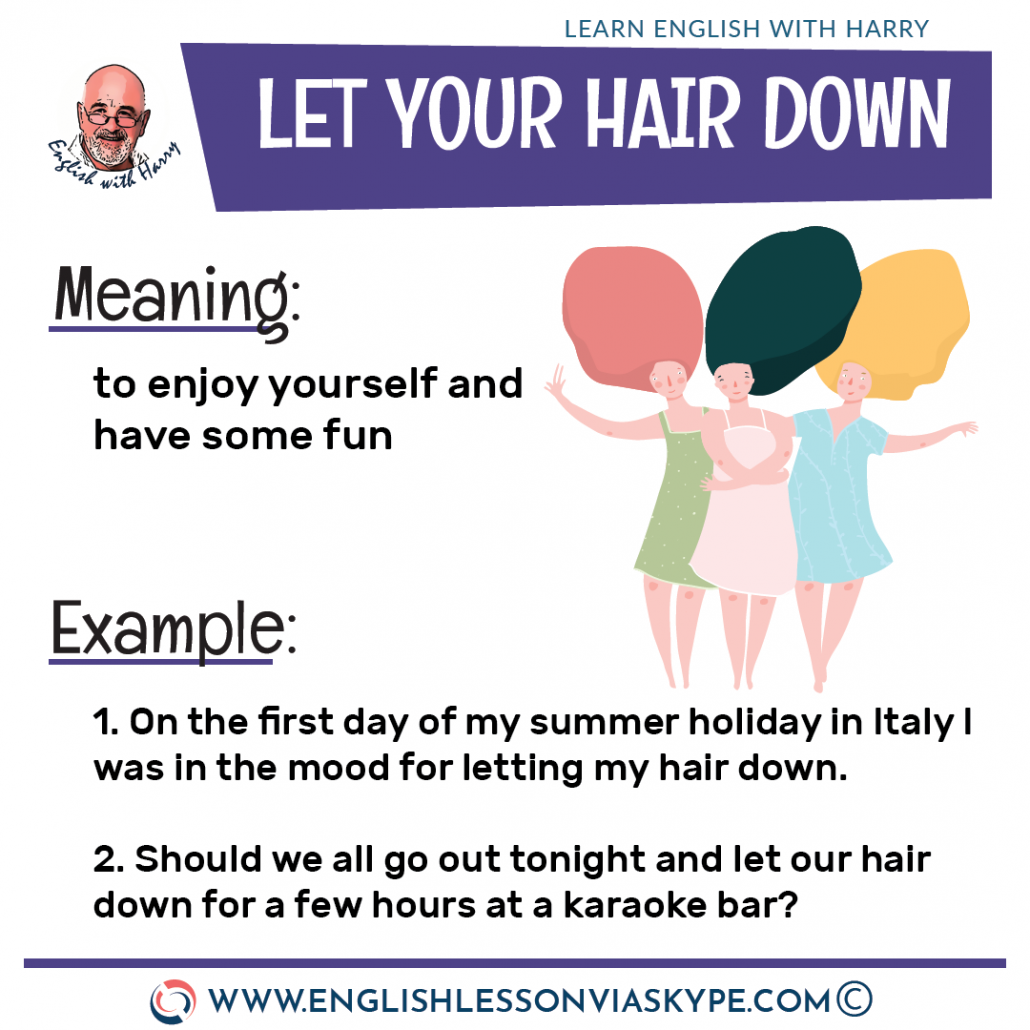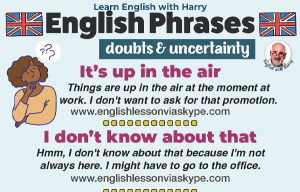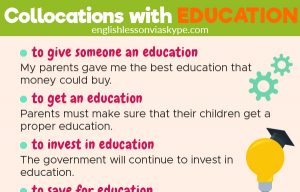Holidays collocations!
The end of December in the U.S. is known as «the Holidays».
The word «holiday» can mean any holiday, from religious holidays
to national holidays like (in the U.S.) Independence Day and Memorial Day.
However, «The Holidays» means the time around the end of the
year. One reason that English speakers call this time of year «The
Holidays» is to avoid simply calling it «Christmas».
«The
Holidays» also include holidays from different religions. Christmas is the
main holiday celebrated in the U.S., but New Year’s Day and the Jewish holiday
of Hanukkah also fall around this time of year. There’s also an
African-American holiday called «Kwanzaa» that only a few people
celebrate but sometimes gets included in «The Holidays».
Here are some phrases that are closely associated with the word
«holiday»:
· Say «Happy Holidays!» when saying goodbye to someone in
late December.
· You can call this time of year «the holiday season«.
· You can also call it «the Christmas holidays«.
· If a holiday happens on a Friday, Saturday, Sunday, or Monday, that weekend
is called the «holiday weekend«.
· If you’re giving a gift but you don’t want to associate it with the
Christian holiday of Christmas, you can call it a «holiday gift«.
· Buying Christmas gifts is called «doing your holiday shopping«.
· A lot of retail stores have holiday sales.
· People do lots of different things to «get into the holiday spirit«,
from listening to holiday music to putting up holiday
decorations.
· Some people send out holiday cards to friends, family, and
coworkers.
·
A lot of people go «home
for the holidays«, meaning to the place where they grew up. There’s a popular song that made this
phrase famous.
· In general, people like to spend the holidays with people
that they love.
· Families each have their own holiday traditions. For example,
some families go to church on Christmas Eve. Some have a big meal with their
extended family. Some sing Christmas carols together.
· You might get invited to a holiday party or two. You might
also have a «holiday gathering«, which is when closer friends
or family get together.
· Christmas is a religious holiday, while New Year’s is a secular
holiday for most Americans.
· The feeling of happiness that you get around this time is called «holiday
cheer«.
Наступает лето, время отпусков и каникул (holiday), поэтому было бы неплохо взглянуть на фразовые глаголы, употребляемые в английском языке по этому поводу. Кстати, слово holiday употребляют англичане, американцы же используют слово vacations.
Фразы, которые помогут вам узнать о планах на лето, а также рассказать о своих планах: go away и get away:
What month are you going away this summer? (В каком месяце вы идете в отпуск этим летом?)
I hope to get away in a month. (Я надеюсь пойти в отпуск через месяц)
Многие люди очень напряженно работают, а отпуск — это пора расслабиться — to wind down, to kick back и to chill out.
Sometimes I have a drink to wind down. (Иногда я могу выпить, чтобы расслабиться.)
I’m going to kick back. (Я собираюсь расслабиться.)
After the maraphon, we used to chill out in each others’ rooms. (После марафона мы обычно отдыхали в своих комнатах.)
Фразовые глаголы в дороге
Итак, вначале мы отправляемся к месту отдыха: set off и head off:
My parents headed off for their holiday in Spain. (Мои родители отправились в свой отпуск в Испанию)
They are going to set off early in the morning. (Они отправляются рано утром)
Если мы летим на самолете, то необходимо пройти регистрацию: to check in.
Часто приходится некоторое время болтаться в аэропорту — to hang around или ожидать посадки на свой рейс — to wait around. Но как только самолет взлетает — takes off, вы уже в пути к заветной цели. Когда самолет приземлится, мы можем сказать — touches down.
She had checked in at Heathrow airport for a flight to Moscow. (Она прошла регистрацию в аэропорту Хитроу на рейс в Москву.)
He got sick of hanging around waiting for me. (Его тошнило от зависания в ожидании меня.)
He was waiting around to speak to the lawyer. (Он ожидал, чтобы поговорить с адвокатом.)
Our plane took off at 11 o’clock and touched down at 15:30. (Наш самолет взлетел в 11 часов и приземлился в 15:30.)
А далее нам может понадобиться другой транспорт: поезд, автобус или корабль, о времени прибытия которого мы узнаем с помощью фраз: get in/into
When does our ship get in? (Когда прибудет наш корабль?)
It gets into Yalta at 5am. (Он прибудет в Ялту в 5 утра.)
Фразовые глаголы в отеле
Ну вот, наконец, мы прибыли в пункт назначения для отдыха, нашли свой отель и теперь нам надо сообщить администрации свои персональные данные — we check into the hotel.
Разместившись в отеле, надо осмотреть окрестности — check out, может быть даже стоит нанять гида, чтобы он показал достопримечательности — show you around.
We couldn’t check into the hotel until 12 o’clock. (Мы не могли заехать в отель до 12 часов.)
I think we should go down to the park and check it out. (Я думаю, нам следует спуститься в парк и проверить его.)
A friend of mine showed us around the attractions. (Мой друг показал нам достопримечательности.)
Фразовые глаголы для описания времяпрепровождения
В отпуске вы встретите людей, с которыми познакомитесь. Может это будут иностранцы, тогда нужно подучить английский — polish up или brush up (on):
They’re polishing up their Spanish. (Они шлифуют свой испанский.)
Elena tried to brush up on her driving. (Елена попыталась освежить свои навыки вождения.)
Кто-то любит активный отдых и планирует сделать много вещей (to pack a lot into), в то время как другие предпочитают полениться (to laze around), просто впитывая (soaking up) атмосферу или созерцая прекрасные виды (taking in). Вы можете просто проводить свое время (to while away), блуждая по прекрасному старинному городу или впитывать (to soak up) солнце на пляже.
I have tried to pack a good deal into my little journey. (Я попытался немало уложить в мое маленькое путешествие.)
We were happy enough to laze around on the beach. (Мы были достаточно счастливы, бездельничая на пляже.)
They while away the time taking photographs of themselves. (Они коротали время, фотографируя самих себя.)
The large terrace is perfect for soaking up the sun. (Большая терраса идеально подходит для впитывания солнца.)
Побалуйте себя!
Отпуск — это время, когда мы можем побаловать себя (to indulge in) едой, которую не позволяем себе в повседневной жизни. Например, походы по кафе и ресторанам (to eat out). Отпуск дает обычно приятный опыт и закруглить его хочется наилучшим образом (to round off). А у кого-то даже может возникнуть соблазн остаться (to stay on)!
She rarely indulges in a glass of wine. (Она редко балует себя бокалом вина.)
If I lived up here, I would eat out here a lot. (Если бы я жил здесь, я бы много питался здесь.)
The Italian way is to round off a meal with an ice-cream. (Итальянский обычай заканчивать еду мороженым.)
They wanted to stay on in Barcelona. (Они хотели остаться в Барселоне.)
Рекомендуем вам словарь www.collinsdictionary.com, в котором можно найти множество фразовых глаголов, пояснения их значений, а также множество примеров их применения.
a busman’s holiday
slang A vacation in which one does an activity that is similar to one’s job (as in the case of a bus driver, or «busman,» who drives on his vacation). Because I’m a docent, visiting museums on vacation is like a busman’s holiday for me. You’re a pilot, so I’m curious—does taking a flight somewhere for vacation feel like a busman’s holiday? No, I don’t want to watch the kids while you guys go into town—that would be like a busman’s holiday. I’d feel like I was back in my classroom wrangling preschoolers.
all holiday
Ruined, bankrupt, or without work, as of a person, business, or organization. I hear that he showed up drunk to the board meeting on Friday. I’d say it’s all holiday for him now. If you don’t get your company’s expenditures under control, it’s going to be all holiday sooner than later! I wagered all I owned on that investment, so now it’s all holiday for me.
be in holiday mode
informal To be in a relaxed, carefree state resulting or as resulting from being on a break from work or school. Primarily heard in UK. The first week of school after the summer break is usually a write-off, as most students are still in holiday mode. A: «How’s it going, Jim?» B: «Just trying to stay focused before I leave for Florida on Friday. I’m kind of in holiday mode already.»
blind man’s holiday
A phrase that refers to the inability to work at night (before electric light was common). It is a «holiday» because one cannot work when it is too dark to see. I don’t mind that it gets dark so early in the winter because then we can go home earlier—it’s a blind man’s holiday! A: «What are you doing home so early?» B: «It’s too dark to keep working so we got to take a blind man’s holiday.»
busman’s holiday
A vacation that is spent engaging in an activity that is similar to what one does for work. As a museum curator, Leonard had a busman’s holiday when he went to Paris to visit the Louvre.
get into holiday mode
informal To enter into a relaxed, carefree state resulting or as resulting from being on a break from work or school. Primarily heard in UK. A: «How’s it going, Jim?» B: «OK, just trying to stay focused. I leave for Florida on Friday, so it’s hard not to get into holiday mode yet.» The last week of school before the summer break is usually a write-off, as most students have already gotten into holiday mode by then. I was so stressed out from work that it took me a couple of days on the beach before I really got into holiday mode.
go into holiday mode
informal To enter into a relaxed, carefree state resulting or as resulting from being on a break from work or school. Primarily heard in UK. A: «How’s it going, Jim?» B: «OK, just trying to stay focused. I leave for Florida on Friday, so it’s hard not to go into holiday mode yet.» The last week of school before the summer break is usually a write-off, as most students have already gone into holiday mode by then. I was so stressed out from work that it took me a couple of days on the beach before I really went into holiday mode.
Happy (Holiday Name)!
A standard greeting and phrase of celebration on a particular holiday. Happy Fourth of July, everyone! A: «Good morning, my love. Happy Valentine’s Day!» B: «Aw, thank you, you’re so sweet. Happy Valentine’s, sweetie.» Three… two… one… Happy New Year’s!
Happy Holidays
A nondenominational greeting used during the winter holiday season to encompass Hanukkah, Christmas, Kwanzaa, New Year’s Day, etc., without being specific. Thank you for shopping with us today. Happy Holidays! A: «Hey, Jim! Happy Holidays!» B: «Happy Holidays, Sarah. Any exciting plans this year?»
high days and holidays
Special occasions, festivities, or holidays. High days and holidays can be especially difficult for older people living on their own, so if you have an elderly friend or relative, pay them a visit today. On high days and holidays, the council building opens its doors and hosts a number of free activities for the public to enjoy.
holiday mode
informal A relaxed, carefree state resulting or as resulting from being on a break from work or school. Primarily heard in UK. A: «How’s it going, Jim?» B: «OK, just trying not to slip into holiday mode before Friday.» The first week of school after summer break is usually a write-off, as most students are still in holiday mode.
in holiday mode
informal In a relaxed, carefree state resulting or as resulting from being on a break from work or school. Primarily heard in UK. The first week of school after the summer break is usually a write-off, as most students are still in holiday mode. A: «How’s it going, Jim?» B: «Just trying to stay focused before I leave for Florida on Friday. I’m kind of in holiday mode already.»
into holiday mode
informal Into a relaxed, carefree state resulting or as resulting from being on a break from work or school. Primarily heard in UK. A: «How’s it going, Jim?» B: «OK, just trying to stay focused. I leave for Florida on Friday, so it’s hard not to slip into holiday mode yet.» The last week of school before the summer break is usually a write-off, as most students have gone into holiday mode by then. I was so stressed out from work that it took me a couple of days on the beach before I really got into holiday mode.
on holiday
Spending time away from work or school, especially to travel some place for recreation. Primarily heard in UK, Ireland. I am planning to be on holiday for two weeks in July, so if you need any help during that time you can contact my colleague Sarah. We’re going to Disney World on holiday this summer!
Roman holiday
An entertaining event, affair, or activity that relies on the exploitation, suffering, or failure of others. A metaphor taken from Lord Byron’s poem Childe Harold’s Pilgrimage, which refers to the practice of having gladiators fight to the death for the amusement of spectators. I think tabloids exist and flourish as a means of providing people with miniature Roman holidays. Being able to see celebrities at their absolute worst gives us a perverse feeling of satisfaction. I’ll never understand the allure of boxing, watching two people beat each other half to death like we’re on some sort of Roman holiday.
slip into holiday mode
informal A relaxed, carefree state resulting or as resulting from being on a break from work or school. Primarily heard in UK. A: «How’s it going, Jim?» B: «OK, just trying to stay focused. I leave for Florida on Friday, so it’s hard not to slip into holiday mode yet.» The last week of school before the summer break is usually a write-off, as most students have already slipped into holiday mode by then. I was so stressed out from work that it took me a couple of days on the beach before I really slipped into holiday mode.
Farlex Dictionary of Idioms. © 2022 Farlex, Inc, all rights reserved.
busman’s holiday leisure
time spent doing something similar to what one does at work. (Alludes to a bus driver going on a bus tour for his vacation or on a day off.) Tutoring students in the evening is a busman’s holiday for our English teacher. It’s a bit of a busman’s holiday to ask her to be wardrobe mistress for our amateur production in the summer. She’s a professional dressmaker.
hell on a holiday
Rur. a big commotion. (Use caution with hell.) It was hell on a holiday outside the stadium when the team won the big game. What’s going on down on Main Street? Sounds like hell on a holiday!
McGraw-Hill Dictionary of American Idioms and Phrasal Verbs. © 2002 by The McGraw-Hill Companies, Inc.
busman’s holiday
Free time spent in much the same pursuit as one’s work. For example, Weather permitting, the lifeguard spent all her days off at the beach-a real busman’s holiday . The term alludes to a bus driver spending his day off taking a long bus ride. [Late 1800s]
The American Heritage® Dictionary of Idioms by Christine Ammer. Copyright © 2003, 1997 by The Christine Ammer 1992 Trust. Published by Houghton Mifflin Harcourt Publishing Company. All rights reserved.
a busman’s holiday
mainly BRITISH
If someone spends part of their holiday doing things they do in their normal job, you can say that they are having a busman’s holiday. This is probably the best fish restaurant in the country — at least one admiring chef a week passes through the cheery dining room on a busman’s holiday. A fire crew’s Christmas outing turned into a busman’s holiday when their coach caught fire. Note: This expression may refer to bus drivers at the beginning of the 20th century when buses were horse-drawn. Drivers sometimes spent their day off riding on their own bus to make sure that the relief drivers were treating the horses properly.
Collins COBUILD Idioms Dictionary, 3rd ed. © HarperCollins Publishers 2012
a busman’s holiday
a holiday or form of recreation that involves doing the same thing that you do at work.
From the late 19th century, a popular form of working-class recreation was to take an excursion by bus.
high days and holidays
special occasions. informal
In the Church’s calendar a high day was the day of an important festival. A holiday (originally holy day ) was similar but less specific. Holiday now refers to any day off, without any sacred significance, and so holy day is used if a specifically religious occasion is intended.
1998 Pamela Jooste Dance with a Poor Man’s Daughter I was too busy looking out for all of you. I only danced on high days and holidays.
a Roman holiday
an occasion on which enjoyment or profit is derived from the suffering or discomfort of others.
This expression comes from the poet Byron’s description of the dying gladiator in Childe Harold’s Pilgrimage as having been ‘butchered to make a Roman holiday’.
Farlex Partner Idioms Dictionary © Farlex 2017
a busman’s ˈholiday
(informal) a holiday spent doing the same kind of thing that you do at work: The fire crew’s annual outing turned into a busman’s holiday when their bus caught fire. Fortunately, no one was hurt in the blaze.This phrase may refer to the drivers of horse-drawn vehicles in the 19th century. When they were not working, they often rode as passengers on their own buses to make sure that the replacement driver was treating their horses well.
ˌhigh days and ˈholidays
festivals and special occasions: This 19th-century dish was traditionally made on high days and holidays, and is still often eaten at Christmas.
Farlex Partner Idioms Dictionary © Farlex 2017
busman’s holiday, a
Free time spent doing the same as one does during working hours. Allegedly the expression comes from the days of horse-drawn buses, when a driver spent his time off traveling about on a bus driven by a friend. It dates from the late nineteenth century.
The Dictionary of Clichés by Christine Ammer Copyright © 2013 by Christine Ammer
- a busman’s holiday
- busman
- busman’s holiday
- busman’s holiday leisure
- busman’s holiday, a
- leisure
- staycation
- be back in (the) harness
- be back in harness
- back to the grind
‘Tis the season when people greet each other and wish each other well more often than usual.
Most English-speaking countries use certain vocabulary, expressions, and greetings for wishing each other a happy holiday. Your students will appreciate learning these English holiday expressions, idioms, and other common phrases. What’s more, you can make this into a productive lesson by teaching them when to capitalize holiday-specific terms.
If you have a multicultural class, have students compare English holiday idioms and festive expressions with what they say in their own languages.
Ready to start teaching your students some fun holiday-related vocabulary and expressions in English? Let’s dive in…
- Holiday vocabulary
- Holiday idioms and expressions
- Holiday greetings
- Holiday slang
Holiday vocabulary: Learn the basics
Before we jump into holiday-related expressions, it’s important to first introduce your language learners to some holiday vocabulary.
Review the spelling and capitalization of these common holidays with your students:
- Christmas Eve
- Christmas Day
- Christmastime
- Christmas morning
- Christmas dinner
- Boxing Day
- Kwanzaa
- Chanuka/Hanukkah
- New Year’s Eve
- New Year’s Day
Holiday idioms and expressions for better conversation
Students love learning idioms and expressions for many reasons—they’re commonly used in conversations, movies, etc., and they’re fun to learn, especially when accompanied by funny, literal illustrations! Recognizing and using idioms also helps learners improve their overall fluency.
We’ve compiled a list of eight familiar holiday idioms and expressions for you to teach this season.
After reviewing, you could follow up by asking if they know any others, having them draw their own literal illustrations, or having them include as many as they can in dialogues they write and perform in pairs.
1. The more the merrier
Meaning: the more people there are, the more enjoyable the event will be
Example: A: “Do you mind if I bring my friends along?” B: “Not at all! The more the merrier!”
2. Be / feel stuffed
Meaning: to be full after eating a heavy meal
Example: No more turkey for me, thanks. I’m stuffed!
3. Deck the halls
Meaning: to decorate the inside of your home for the holidays
Example: This weekend I will deck the halls with lights, shiny tinsel, and mistletoe.
4. Snowed in
Meaning: unable to leave because there’s too much snow
Example: My house is out in the country, so sometimes I’m snowed in for a week or so.
5. Get into the holiday spirit
Meaning: to feel joyful during the holiday season
Example: Sherry baked gingerbread cookies and put on some Christmas music to help her get into the holiday spirit.
6. Scrooge / Grinch
Meaning: a grumpy and unkind person who doesn’t like celebrating the holidays
Example: He wouldn’t even let me put on some holiday music. What a Scrooge!
7. Be there with bells on
Meaning: to be eager and more than happy to do something or go somewhere
Example: I asked him if he was coming to the party. He told me he’ll be there with bells on!
8. Ring in the new year
Meaning: to celebrate the end of the previous year and the beginning of the new one
Example: Carlos plans to ring in the new year with his three best friends.
Holiday greetings for cards, emails, or texts
Holiday greetings are spoken to friends, family, neighbors, coworkers, and even strangers on the street or in stores. These expressions are also written in cards, emails, text messages, etc.
When written, many people follow the holiday greeting with an exclamation mark (e.g., Happy Holidays!). Note: “Happy Holidays” and “Season’s Greetings” are usually capitalized, but “Happy holidays” and “Season’s greetings” are also possible.
Your students will likely appreciate knowing how to wish each other well in English during the holiday season.
Spread the joy with these popular English holiday greetings:
- Happy Holidays (more neutral as it includes all winter holidays)
- Season’s Greetings (more neutral and formal)
- Merry Christmas (common in American and Canadian English)
- Happy Christmas (common in British English)
- Happy Chanukah/Hanukkah (Jewish festival also known as “The Festival of Lights”)
- Happy Kwanzaa (celebration that honors African heritage in African American culture)
- Happy New Year (“Happy New Year’s” is a common mistake people make)
Are your students planning on sending greetings cards or emails to their family or colleagues this holiday season? Try this festive activity: Have your students write a holiday greeting card in English using their favorite holiday greeting.
Keep in mind!
People might be celebrating a variety of holidays during this season. If you’re not certain if a colleague or acquaintance celebrates Christmas, choose a neutral greeting such as “Happy Holidays” or “Season’s Greetings.”
Holiday slang words every student should know
It’s important for English learners to become familiar with holiday slang (slang is short for “short language”). These common, every day expressions and phrases are often used in informal settings.
Teaching them some fun holiday slang will help students improve their fluency as well as their conversational skills.
Here are two holiday words that are often used as slang:
Prezzies
This shortened form of “presents” is heard more and more these days. Both “prezzies” and “pressies” are pronounced preh zees (/ˈprɛ ziz/). The difference in spelling depends on where you live.
- prezzies (preferred spelling in North American English)
- pressies (preferred spelling in British English, but prezzies is also common)
Xmas
“Xmas” is the shortened form of “Christmas» and is pronounced eks muhs (/’ɛks məs/). Xmas is most commonly used in informal settings, especially when writing to close friends and family. It’s not so common in everyday verbal conversations.
- Xmas (singular noun)
- Xmases (plural noun)
Keep in mind!
Some people might be offended by the abbreviation of “Christ” to “X” because it puts the focus on commercialization instead of on Christ, the religious figure at the center of this Christian holiday. When in doubt, don’t abbreviate.
Related materials
We’ve got you covered for holiday lessons and fun!
- December Holidays collection
- Christmas flashcards
- New Year’s flashcards
- How to Make a Paper Snowflake
- Make a Sweet Gingerbread Door for Your Classroom
- How to Write Holiday Greeting Cards in English
- Sleigh Vs. Sled: What’s the Difference?
- «Merry Christmas» or «Happy Holidays»? Let’s Debate!
Editor’s note: This post was originally published in December 2013 and has been updated for comprehensiveness.
Here you will learn useful English idioms about holidays and travel.
Idioms are phrases that don’t mean what they say. Idioms are confusing because each one has a special meaning. If you don’t know the special meaning, you won’t understand what someone is saying.
And here is your chance to increase your English travel vocabulary, just check out this link.
Table of Contents
Harry
Harry is a native English teacher with over 10 years of experience both online and in face-to-face lessons. With his extensive experience in business, he specialises in Business English lessons but happily teaches ESL students with any English learning needs.
17 Idioms about Holidays and Travel
Share! Help other students to improve English skills.
1️⃣ to take things easy
Meaning: to relax
Example:
After a lot of persuading he finally agreed that we both needed time to take things easy for a bit.
At this pretty traditional cottage, guests can simply sit back and take things easy.
2️⃣ off the beaten track
Meaning: isolated and quiet, not visited by many tourists
Example:
My last holiday was brilliant. No internet or traffic or anything like that for a whole week. It was completely off the beaten track.
improve english on a budget
Online English Courses from €7.99
3️⃣ in your element
Meaning: very happy/suited to a situation
Example:
I was in my element. A bit of walking or fishing with no one telling you what to do.
4️⃣ run-of-the-mill
Meaning: ordinary and unexciting place
Example:
I’m really tired of the same run-of-the-mill holiday places. This summer I want to go somewhere new.
5️⃣ as brown as a berry
Meaning: very suntanned
Example:
When I arrived home after my holidays I was as brown as a berry and felt great.
17 Idioms about Holidays and Travel
6️⃣ round the clock
Meaning: all day and all night
Example:
This holiday destination has it all. White sandy beaches and round-the-clock bars and discos where you can dance all night.
7️⃣ to get into the swing of something
Meaning: to become accustomed to something and start enjoying it
Example:
Going on holidays on your own can be nerve-racking, but once you get into the swing of it, you’ll really enjoy it.
8️⃣ to steer clear of
Meaning: to avoid something/somebody
Example:
If you are not a fan of the hot weather, steer clear of this area in the summer months.
Since curry upsets my stomach, I steer clear of it.
9️⃣ to let your hair down
Meaning: to enjoy yourself and have some fun
Example:
On the first day of my summer holiday in Italy, I was in the mood for letting my hair down.
Let Your Hair Down — Idiom Meaning
Share! Help other students to improve English skills.
17 Idioms about Holidays and Travel
1️⃣0️⃣ a new lease of life
Meaning: a burst of new energy and enthusiasm
Example:
I returned home with a glow and looked healthy again. I had energy. It was a new lease of life.
1️⃣1️⃣ to get away from it all
Meaning: to escape from your daily problems
Example:
We decided to go to a desert island so that we could get away from it all.
1️⃣2️⃣ to catch your eye
Meaning: to get your attention
Example:
The beautiful dress in the shop window caught my eye, so I went in and bought it.
Cheap flights seat sales caught my eye last week and I decided to book flights to Majorca.
1️⃣3️⃣ right up your street
Meaning: within your range of interests/knowledge
Example:
This place sounds right up my street, I’m going to book it for next summer.
book your trial English Lesson
1️⃣4️⃣ to get itchy feet
Meaning: to like to travel
Example:
Sam never stays in one place for long; he’s got itchy feet.
1️⃣5️⃣ to hit the road
Meaning: to set off, to start a journey
Example:
We’ve got a long way to go before it gets dark. Let’s hit the road.
1️⃣6️⃣ to travel light
Meaning: to take the essentials only
Example:
When we fly with a budget airline, we don’t take much with us; we prefer to travel light.
1️⃣7️⃣ to live out of a suitcase
Meaning: live briefly in several places
Example:
Pamela continuously travels from place to place; she seems to be living out of a suitcase.
More information
You will love these English lessons
English Vocabulary
Useful English Collocations
English Idioms


